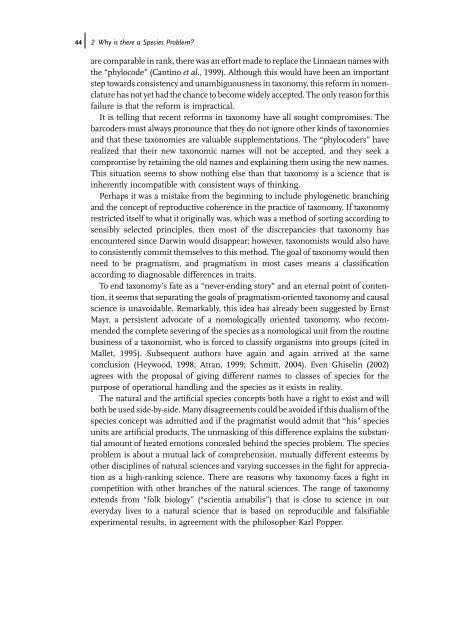Principios de Taxonomia
Create successful ePaper yourself
Turn your PDF publications into a flip-book with our unique Google optimized e-Paper software.
44j 2 Why is there a Species Problem?<br />
are comparable in rank, there was an effort ma<strong>de</strong> to replace the Linnaean names with<br />
the phyloco<strong>de</strong> (Cantino et al., 1999). Although this would have been an important<br />
step towards consistency and unambiguousness in taxonomy, this reform in nomenclature<br />
has not yet had the chance to become wi<strong>de</strong>ly accepted. The only reason for this<br />
failure is that the reform is impractical.<br />
It is telling that recent reforms in taxonomy have all sought compromises. The<br />
barco<strong>de</strong>rs must always pronounce that they do not ignore other kinds of taxonomies<br />
and that these taxonomies are valuable supplementations. The phyloco<strong>de</strong>rs have<br />
realized that their new taxonomic names will not be accepted, and they seek a<br />
compromise by retaining the old names and explaining them using the new names.<br />
This situation seems to show nothing else than that taxonomy is a science that is<br />
inherently incompatible with consistent ways of thinking.<br />
Perhaps it was a mistake from the beginning to inclu<strong>de</strong> phylogenetic branching<br />
and the concept of reproductive coherence in the practice of taxonomy. If taxonomy<br />
restricted itself to what it originally was, which was a method of sorting according to<br />
sensibly selected principles, then most of the discrepancies that taxonomy has<br />
encountered since Darwin would disappear; however, taxonomists would also have<br />
to consistently commit themselves to this method. The goal of taxonomy would then<br />
need to be pragmatism, and pragmatism in most cases means a classification<br />
according to diagnosable differences in traits.<br />
To end taxonomy s fate as a never-ending story and an eternal point of contention,<br />
it seems that separating the goals of pragmatism-oriented taxonomy and causal<br />
science is unavoidable. Remarkably, this i<strong>de</strong>a has already been suggested by Ernst<br />
Mayr, a persistent advocate of a nomologically oriented taxonomy, who recommen<strong>de</strong>d<br />
the complete severing of the species as a nomological unit from the routine<br />
business of a taxonomist, who is forced to classify organisms into groups (cited in<br />
Mallet, 1995). Subsequent authors have again and again arrived at the same<br />
conclusion (Heywood, 1998; Atran, 1999; Schmitt, 2004). Even Ghiselin (2002)<br />
agrees with the proposal of giving different names to classes of species for the<br />
purpose of operational handling and the species as it exists in reality.<br />
The natural and the artificial species concepts both have a right to exist and will<br />
both be used si<strong>de</strong>-by-si<strong>de</strong>. Many disagreements could be avoi<strong>de</strong>d if this dualism of the<br />
species concept was admitted and if the pragmatist would admit that his species<br />
units are artificial products. The unmasking of this difference explains the substantial<br />
amount of heated emotions concealed behind the species problem. The species<br />
problem is about a mutual lack of comprehension, mutually different esteems by<br />
other disciplines of natural sciences and varying successes in the fight for appreciation<br />
as a high-ranking science. There are reasons why taxonomy faces a fight in<br />
competition with other branches of the natural sciences. The range of taxonomy<br />
extends from folk biology ( scientia amabilis ) that is close to science in our<br />
everyday lives to a natural science that is based on reproducible and falsifiable<br />
experimental results, in agreement with the philosopher Karl Popper.



